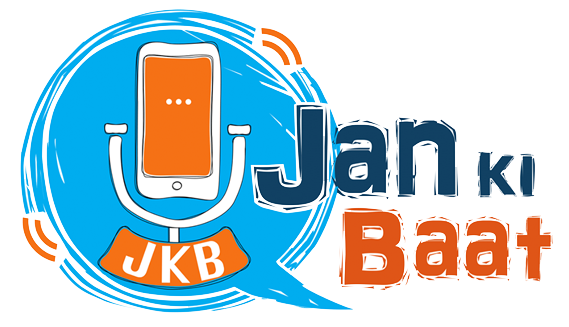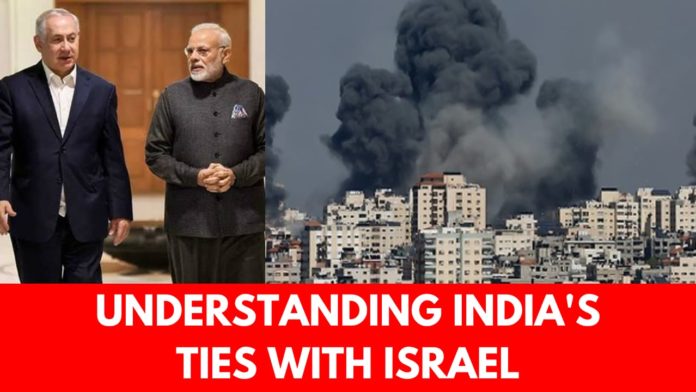On October 7th, 2023, Hamas, the militant group governing the Gaza Strip, launched a brazen attack on Israeli territory, marking one of the most audacious assaults within the Jewish state’s borders since its inception in 1948. Prime Minister Narendra Modi, expressing his shock at what he unequivocally labeled ‘terrorist attacks,’ promptly conveyed India’s unwavering solidarity with Israel.
This stance represents a noteworthy shift in India’s diplomatic relations, which have traditionally not condoned Hamas’ actions. At the heart of this evolving dynamic lies the strong personal chemistry between Prime Minister Narendra Modi and his Israeli counterpart, Benjamin Netanyahu, serving as the cornerstone of this burgeoning partnership.
In the following article, Sagarika Mitra, Content Head of JAN KI BAAT aims to simplify and address critical questions surrounding India’s position in the Israel-Hamas conflict, shedding light on its history and evolving geo-political ties
1) What does Prime Minister Narendra Modi’s response to the Israel-Hamas situation signify?
Prime Minister Narendra Modi’s recent response signifies a notable change in India’s stance. He has characterised the ongoing conflict as a ‘terrorist attack,’ extended solidarity to Israel, and conveyed compassion for innocent victims. While not directly attributing responsibility to Hamas, this shift underscores India’s burgeoning support for Israel, marking a departure from its previous balanced approach.
2) How has India’s diplomatic engagement with Israel progressed over the years?
India formally acknowledged Israel’s existence in 1950, but it wasn’t until 1992 that full-fledged diplomatic relations were established. Over the years, this partnership has demonstrated consistent growth, with a significant milestone being Prime Minister Modi’s historic visit to Israel in 2017, making him the first Indian Prime Minister to undertake such a journey. The bilateral trade between the two nations has surged remarkably, surmounting the $7.5 billion mark in 2022, signifying a substantial increase from the $200 million recorded in 1992. Furthermore, Israel has ascended to become India’s third-largest defence partner
3) What is the Indian community’s presence in Israel?
Approximately 18,000 Indians are currently residing in Israel, contributing to a diverse array of professions such as caregiving, diamond trading, IT, and academics. Notably, around 900 Indian students, predominantly pursuing doctoral and post-doctoral studies, enrich the educational landscape in Israel. Additionally, Israel is home to an estimated 85,000 Jews of Indian origin
4) What impact might the Israel-Hamas war have on the India-Middle East-Europe Economic Corridor, recently announced during the G20 summit?
The India-Middle East-Europe Economic Corridor, a significant regional initiative unveiled during the G20 summit, faces its initial challenge amid the escalating conflict in the region. The corridor’s success hinges on a stable West Asia, and any disruption resulting from the conflict could potentially affect this ambitious project.
5) What is the historical backdrop of India’s relationship with Israel and Palestine?
India’s diplomatic engagement with Israel and Palestine has evolved over the years. While India recognised Israel in 1950, full diplomatic relations were only established in 1992. India’s historical support for the Palestinian cause dates back to leaders like Jawaharlal Nehru and Mahatma Gandhi, who advocated for a unified Palestine. Despite recognizing Israel, India continued to support the Palestinian Liberation Organization (PLO) as the legitimate representative of the Palestinian people.
6) How did leaders like Indira Gandhi and Rajiv Gandhi approach the Israel-Palestine issue?
Both Indira Gandhi and Rajiv Gandhi supported the Palestinian struggle. Yasser Arafat, the leader of the PLO, had a close relationship with India during the 1980s. India maintained its support for the Palestinian cause even during the Palestinian intifada in the late 1980s. After Indira Gandhi was assassinated, Yasser Arafat attended the funeral and wept in public.
7) When did the shift in India-Israel-Palestine ties occur?
A critical shift in India’s ties with Israel and Palestine became evident in the 1990s, back then the geopolitical landscape underwent dramatic transformations, particularly in West Asia. Iraq’s invasion of Kuwait and the waning influence of the Palestinian Liberation Organization (PLO) due to its support for Saddam Hussein led to a change in dynamics. Concurrently, the dissolution of the Soviet Union prompted India to reevaluate its West Asia policy. In 1992, India established full diplomatic relations with Israel, closely following China’s similar diplomatic engagement with Tel Aviv. During Yasser Arafat’s visit to India in 1992, Prime Minister PV Narasimha Rao conveyed that India’s diplomatic ties with Israel could aid the Palestinian cause, ultimately securing his agreement.
It’s also important to highlight here that Arab countries had adopted a ‘neutral’ stance during the 1962 India-China war, but during the 1965 and 1971 wars, they lent support to Pakistan, causing a strain. In contrast, Israel provided crucial arms and ammunition during the 1962 and 1965 conflicts.
8) How did Israel assist India during the Kargil War?
During the Kargil War in 1999, Israel provided critical support to India. Indian forces needed precision target bombs, and Israel swiftly supplied them, including mortar and ammunition. Israel’s assistance played a crucial role in neutralizing Pakistani intruders in the Kargil region.
9) What marked a significant diplomatic moment in India-Israel relations?
A significant milestone was Prime Minister Narendra Modi’s historic visit to Israel in 2017, the first-ever by an Indian Prime Minister. During this visit, Prime Minister Modi skipped the customary stop in Palestine, emphasizing India’s growing focus on its relationship with Israel. This marked a de-hyphenation of ties between India, Israel, and Palestine.
10) What is the current state of India’s diplomatic relationship with Israel?
India’s diplomatic relationship with Israel has continued to strengthen. Bilateral trade has surged from $200 million in 1992 to over $7.5 billion in 2022. Israel is now India’s seventh-largest trade partner and third-largest defense collaborator. Prime Minister Modi’s visits to both Israel and Palestine in the past underscored India’s commitment to balanced engagement in the region.
11) How does the Israel-Hamas conflict affect India’s foreign policy?
The evolving situation in the Israel-Hamas conflict has prompted India to show solidarity with Israel. Balancing this stance with its relationships in the Middle East is crucial for India’s foreign policy. India is concerned about the conflict’s humanitarian aspects and potential implications for its energy security in the Middle East.
12) What are the potential implications for India’s energy security in the Middle East due to this conflict?
India imports a significant portion of its energy resources from the Middle East. Any escalation or instability in the region could potentially affect India’s energy security and its economy. This aspect is closely monitored by Indian authorities.

